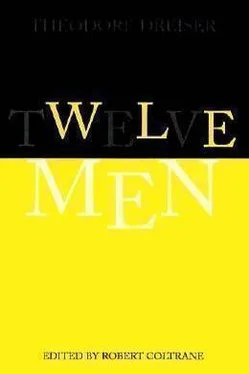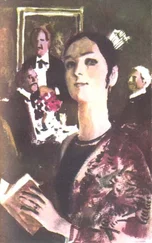Теодор Драйзер - Twelve Men
Здесь есть возможность читать онлайн «Теодор Драйзер - Twelve Men» весь текст электронной книги совершенно бесплатно (целиком полную версию без сокращений). В некоторых случаях можно слушать аудио, скачать через торрент в формате fb2 и присутствует краткое содержание. Год выпуска: 2014, Издательство: epubBooks Classics, Жанр: Биографии и Мемуары, на английском языке. Описание произведения, (предисловие) а так же отзывы посетителей доступны на портале библиотеки ЛибКат.
- Название:Twelve Men
- Автор:
- Издательство:epubBooks Classics
- Жанр:
- Год:2014
- ISBN:нет данных
- Рейтинг книги:4 / 5. Голосов: 1
-
Избранное:Добавить в избранное
- Отзывы:
-
Ваша оценка:
- 80
- 1
- 2
- 3
- 4
- 5
Twelve Men: краткое содержание, описание и аннотация
Предлагаем к чтению аннотацию, описание, краткое содержание или предисловие (зависит от того, что написал сам автор книги «Twelve Men»). Если вы не нашли необходимую информацию о книге — напишите в комментариях, мы постараемся отыскать её.
Twelve Men — читать онлайн бесплатно полную книгу (весь текст) целиком
Ниже представлен текст книги, разбитый по страницам. Система сохранения места последней прочитанной страницы, позволяет с удобством читать онлайн бесплатно книгу «Twelve Men», без необходимости каждый раз заново искать на чём Вы остановились. Поставьте закладку, и сможете в любой момент перейти на страницу, на которой закончили чтение.
Интервал:
Закладка:
Twelve Men
Theodore Dreiser
Peter
In any group of men I have ever known, speaking from the point of view of character and not that of physical appearance, Peter would stand out as deliciously and irrefutably different. In the great waste of American intellectual dreariness he was an oasis, a veritable spring in the desert. He understood life. He knew men. He was free—spiritually, morally, in a thousand ways, it seemed to me.
As one drags along through this inexplicable existence one realizes how such qualities stand out; not the pseudo freedom of strong men, financially or physically, but the real, internal, spiritual freedom, where the mind, as it were, stands up and looks at itself, faces Nature unafraid, is aware of its own weaknesses, its strengths; examines its own and the creative impulses of the universe and of men with a kindly and non–dogmatic eye, in fact kicks dogma out of doors, and yet deliberately and of choice holds fast to many, many simple and human things, and rounds out life, or would, in a natural, normal, courageous, healthy way.
The first time I ever saw Peter was in St. Louis in 1892; I had come down from Chicago to work on the St. Louis Globe–Democrat , and he was a part of the art department force of that paper. At that time—and he never seemed to change later even so much as a hair's worth until he died in 1908—he was short, stocky and yet quick and even jerky in his manner, with a bushy, tramp–like "get–up" of hair and beard, most swiftly and astonishingly disposed of at times only to be regrown at others, and always, and intentionally, I am sure, most amusing to contemplate. In addition to all this he had an air of well–being, force and alertness which belied the other surface characteristics as anything more than a genial pose or bit of idle gayety.
Plainly he took himself seriously and yet lightly, usually with an air of suppressed gayety, as though saying, "This whole business of living is a great joke." He always wore good and yet exceedingly mussy clothes, at times bespattered with ink or, worse yet, even soup—an amazing grotesquery that was the dismay of all who knew him, friends and relatives especially. In addition he was nearly always liberally besprinkled with tobacco dust, the source of which he used in all forms: in pipe, cigar and plug, even cigarettes when he could obtain nothing more substantial. One of the things about him which most impressed me at that time and later was this love of the ridiculous or the grotesque, in himself or others, which would not let him take anything in a dull or conventional mood, would not even permit him to appear normal at times but urged him on to all sorts of nonsense, in an effort, I suppose, to entertain himself and make life seem less commonplace.
And yet he loved life, in all its multiform and multiplex aspects and with no desire or tendency to sniff, reform or improve anything. It was good just as he found it, excellent. Life to Peter was indeed so splendid that he was always very much wrought up about it, eager to live, to study, to do a thousand things. For him it was a workshop for the artist, the thinker, as well as the mere grubber, and without really criticizing any one he was "for" the individual who is able to understand, to portray or to create life, either feelingly and artistically or with accuracy and discrimination. To him, as I saw then and see even more clearly now, there was no high and no low. All things were only relatively so. A thief was a thief, but he had his place. Ditto the murderer. Ditto the saint. Not man but Nature was planning, or at least doing, something which man could not understand, of which very likely he was a mere tool. Peter was as much thrilled and entendered by the brawling strumpet in the street or the bagnio as by the virgin with her starry crown. The rich were rich and the poor poor, but all were in the grip of imperial forces whose ruthless purposes or lack of them made all men ridiculous, pathetic or magnificent, as you choose. He pitied ignorance and necessity, and despised vanity and cruelty for cruelty's sake, and the miserly hoarding of anything. He was liberal, material, sensual and yet spiritual; and although he never had more than a little money, out of the richness and fullness of his own temperament he seemed able to generate a kind of atmosphere and texture in his daily life which was rich and warm, splendid really in thought (the true reality) if not in fact, and most grateful to all. Yet also, as I have said, always he wished to seem the clown, the scapegrace, the wanton and the loon even, mouthing idle impossibilities at times and declaring his profoundest faith in the most fantastic things.
Do I seem to rave? I am dealing with a most significant person.
In so far as I knew he was born into a mid–Western family of Irish extraction whose habitat was southwest Missouri. In the town in which he was reared there was not even a railroad until he was fairly well grown—a fact which amused but never impressed him very much. Apropos of this he once told me of a yokel who, never having seen a railroad, entered the station with his wife and children long before train time, bought his ticket and waited a while, looking out of the various windows, then finally returned to the ticket–seller and asked, "When does this thing start?" He meant the station building itself. At the time Peter had entered upon art work he had scarcely prosecuted his studies beyond, if so far as, the conventional high or grammar school, and yet he was most amazingly informed and but little interested in what any school or college had to offer. His father, curiously enough, was an educated Irish–American, a lawyer by profession, and a Catholic. His mother was an American Catholic, rather strict and narrow. His brothers and sisters, of whom there were four, were, as I learned later, astonishingly virile and interesting Americans of a rather wild, unsettled type. They were all, in so far as I could judge from chance meetings, agnostic, tense, quick–moving—so vital that they weighed on one a little, as very intense temperaments are apt to do. One of the brothers, K―, who seemed to seek me out ever so often for Peter's sake, was so intense, nervous, rapid–talking, rapid–living, that he frightened me a little. He loved noisy, garish places. He liked to play the piano, stay up very late; he was a high liver, a "good dresser," as the denizens of the Tenderloin would say, an excellent example of the flashy, clever promoter. He was always representing a new company, introducing something—a table or laxative water, a shaving soap, a chewing gum, a safety razor, a bicycle, an automobile tire or the machine itself. He was here, there, everywhere—in Waukesha, Wisconsin; San Francisco; New York; New Orleans. "My, my! This is certainly interesting!" he would exclaim, with an air which would have done credit to a comedian and extending both hands. "Peter's pet friend, Dreiser! Well, well, well! Let's have a drink. Let's have something to eat. I'm only in town for a day. Maybe you'd like to go to a show—or hit the high places? Would you? Well, well, well! Let's make a night of it! What do you say?" and he would fix me with a glistening, nervous and what was intended no doubt to be a reassuring eye, but which unsettled me as thoroughly as the imminence of an earthquake. But I was talking of Peter.
The day I first saw him he was bent over a drawing–board illustrating a snake story for one of the Sunday issues of the Globe–Democrat , which apparently delighted in regaling its readers with most astounding concoctions of this kind, and the snake he was drawing was most disturbingly vital and reptilian, beady–eyed, with distended jaws, extended tongue, most fatefully coiled.
"My," I commented in passing, for I was in to see him about another matter, "what a glorious snake!"
Читать дальшеИнтервал:
Закладка:
Похожие книги на «Twelve Men»
Представляем Вашему вниманию похожие книги на «Twelve Men» списком для выбора. Мы отобрали схожую по названию и смыслу литературу в надежде предоставить читателям больше вариантов отыскать новые, интересные, ещё непрочитанные произведения.
Обсуждение, отзывы о книге «Twelve Men» и просто собственные мнения читателей. Оставьте ваши комментарии, напишите, что Вы думаете о произведении, его смысле или главных героях. Укажите что конкретно понравилось, а что нет, и почему Вы так считаете.









